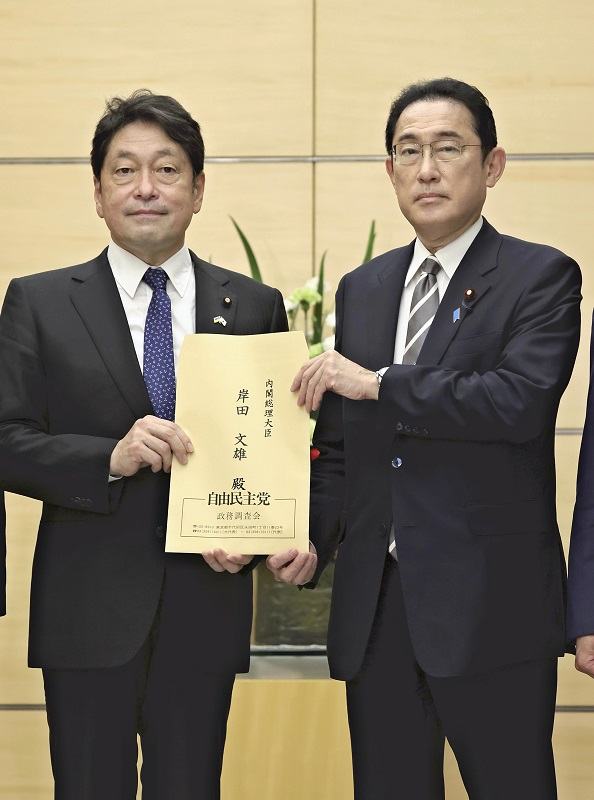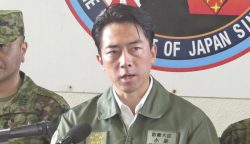Coordination, clear messaging needed in discussions on counterattack capabilities

Prime Minister Fumio Kishida and Itsunori Onodera, chairman of the LDP’s Research Commission on Security, pose with an envelope containing security proposals at the Prime Minister’s Office on April 27.
7:10 JST, May 23, 2022
The ruling Liberal Democratic Party will debate whether Japan can possess counterattack capabilities for self-defense purposes despite of the stipulation in the Constitution stating “the right of belligerency of the state will not be recognized.”
Ahead of a revision slated for this year to the National Security Strategy and two other security-related documents, the LDP has submitted proposals to Prime Minister Fumio Kishida. The main pillar of the revisions is the possession of counterattack capabilities for self-defense purposes so that enemy missile launch sites and other facilities could be targeted in the event of an attack.
Experts said that it will be necessary for Japan and the United States to coordinate security strategies to ensure their effectiveness. The overall picture of Japan’s defense policy will also need to be carefully explained to the public.
As an explanation for why Japan needs to possess counterattack capabilities, the LDP’s Research Commission on Security states in its proposals that “rapid changes and advances in missile technology have made intercepting missiles difficult, and there is a fear that relying on interception alone would not be enough to defend the country.”
Japan has a two-stage defense system against ballistic missile attacks: SM-3 interceptor missiles fired from Aegis-equipped destroyers for targeting missiles outside the earth’s atmosphere, and ground-to-air guided missiles from the Patriot Advanced Capability-3 (PAC-3) system to target missiles if the first interception fails.
North Korea has repeatedly launched ballistic missiles that fly on a lofted trajectory at higher altitudes than conventional ballistic missiles, which makes it more difficult to intercept them.
It has also been claimed that North Korea has the capability of launching a so-called saturation attack, in which several missiles are launched simultaneously to overwhelm the missile defenses of the target.
Meanwhile, China is developing hypersonic missiles that fly at more than five times the speed of sound on irregular trajectories, and Russia is said to have used hypersonic missiles for the first time in combat during its invasion of Ukraine.
Distinction from preemptive strike
“Capability to attack enemy bases” had been discussed in the past, but the commission used term counterattack capabilities. Although it is plausible, in legal terms, for Japan to possess counterattack capabilities, no administration has pursued such policies.
In 1956, then Prime Minister Ichiro Hatoyama expressed his view that the Constitution could not stipulate Japan should idly wait to be destroyed.
Kishida has said he would consider possessing the capability to attack enemy bases, but some opposition parties have criticized the idea, claiming it could lead to a preemptive attack. To clearly distinguish it from preemptive strike, which is against international law, the commission sought to change the expression.
Consultations within the ruling coalition parties will be held after the House of Councillors election. By the end of the year, the government plans to finalize three security-related documents: the National Security Strategy, the National Defense Program Outline, and the Medium Term Defense Program.
A former defense minister said, “Deterrence would be enhanced if the Self Defense Forces possess part of counterattack capabilities with the basic division of roles between Japan and the United States maintained as they are.”
The commission’s proposals also state that Japan should maintain an“exclusively defense-oriented policy,” under which forces are used only in the event of an armed attack, and their use is limited to the minimum extent necessary for self-defense.
The government has held the view that possessing offensive weapons whose main purpose is to cause catastrophic damage in enemy territory exceeds the principle of using the minimum force required for self-defense.
Such capabilities include intercontinental ballistic missiles mounted with nuclear warheads, long-range strategic bombers, and offensive aircraft carriers, none of which Japan possesses.
Under the proposals, counterattacks would be pinpoint attacks on military facilities with long-range cruise missiles from warships and aircraft. In addition to extending the range covered by the Ground Self-Defense Force’s Type 12 surface-to-ship missile, the government will also consider using surface-to-surface hyper velocity gliding projectiles.
Nonlethal means of disabling communications and other functions with electromagnetic waves and cyberattacks are also under consideration. To accurately determine the location of enemy bases, it will be necessary to enhance surveillance capabilities using satellites and drones.
The proposals call on the government to include command-and-control functions such as enemy headquarters within the scope of counterattack targets, as the enemy could launch missiles from mobile launchers, submarines, or aircraft.
Security expert Prof. Tetsuo Kotani of Meikai University said, “As counterattacks would involve Japanese and U.S. forces, it will be necessary to consider how the functions of command should be coordinated between the SDF and the U.S. military.”
Top Articles in Politics
-

LDP Wins Historic Landslide Victory
-

LDP Wins Landslide Victory, Secures Single-party Majority; Ruling Coalition with JIP Poised to Secure Over 300 seats (UPDATE 1)
-

Japan Tourism Agency Calls for Strengthening Measures Against Overtourism
-

CRA Leadership Election Will Center on Party Rebuilding; Lower House Defeat Leaves Divisions among Former CDPJ, Komeito Members
-

Voters Using AI to Choose Candidates in Japan’s Upcoming General Election; ChatGPT, Other AI Services Found Providing Incorrect Information
JN ACCESS RANKING
-

Japan Institute to Use Domestic Commercial Optical Lattice Clock to Set Japan Standard Time
-

Israeli Ambassador to Japan Speaks about Japan’s Role in the Reconstruction of Gaza
-

Man Infected with Measles May Have Come in Contact with Many People in Tokyo, Went to Store, Restaurant Around When Symptoms Emerged
-

China Eyes Rare Earth Foothold in Malaysia to Maintain Dominance, Counter Japan, U.S.
-

Prudential Life Insurance Plans to Fully Compensate for Damages Caused by Fraudulent Actions Without Waiting for Third-Party Committee Review






















